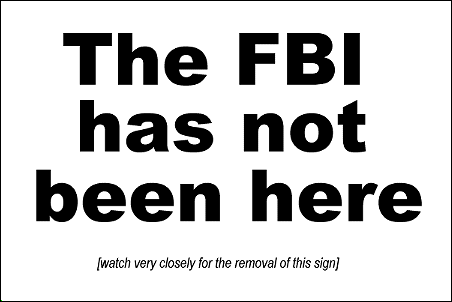Silencing the Alarm
If you have a smart phone or tablet — an iPhone or iPad, for example — it collects a lot of data about you. So in turn, Apple — the company which makes those devices and provides all the apps, etc. — also knows a lot about you. And various governments may be interested in that information. That can be unsettling for some customers, so in 2013, Apple started issuing a “Transparency Report” every six months or so. As Apple explained in its first report, available here (pdf), the document is designed to inform Apple’s customers about “the requests we [Apple] receive from governments seeking information about individual users or devices.” Shortly thereafter, Apple offers a caveat: “We have reported all the information we are legally allowed to share.” Basically, there are some government requests that Apple can’t tell us about.
Which is why the second to last line of the above-linked Transparency Report is so interesting. It reads, matter-of-factly:
Apple has never received an order under Section 215 of the USA Patriot Act.
For context, if you head over to Wikipedia, you’ll find that Section 215 has a very specific feature which makes Apple’s disclosure somewhat odd:
This section of the PATRIOT Act is controversial because the order may be granted ex parte [without the other party present to object — this is very rare in the U.S.], and once it is granted — in order to avoid jeopardizing the investigation — the order may not disclose the reasons behind why the order was granted.
The section carries a gag order stating that “No person shall disclose to any other person (other than those persons necessary to produce the tangible things under this section) that the Federal Bureau of Investigation has sought or obtained tangible things under this section”.
To summarize: If Apple received an order under Section 215, it likely wouldn’t know why. And more to the point: it couldn’t tell us anyway.
So if Apple can’t tell us that it had received such an order, why bother with telling us that it hadn’t received one? The prevailing wisdom at the time was that Apple was using something called a “warrant canary,” a neat but itself-controversial work-around to the gag order part of Section 215. Like the proverbial “canary in the coal mine,” the warrant canary acts as a warning of the presence of something potentially bad. Ars Technica explained:
Warrant canaries work like this: a company publishes a notice saying that a warrant has not been served as of a particular date. Should that notice be taken down, users are to surmise that the company has indeed been served with one. The theory is that while a court can compel someone to not speak (a gag order), it cannot compel someone to lie. The only problem is that warrant canaries have yet to be fully tested in court.
The idea dates back to 2004, when the FBI used a similar process to go after library records and applied the same type of gag order. (Wired has a good discussion of the that process here.) In response, a librarian named Jessamyn West came up with the idea for signs which her fellow librarians could post (if accurate), stating simply that everything was OK, as seen below. (Pay particular attention to the small text at the bottom.)

But as Ars Technica noted above, whether this is actually legally permissible is questionable. Some argue that it isn’t — any gag order would effectively prevent the removal of the sign, as removing the sign would be akin to disclosing what happened. Others, however, disagree, arguing that because the First Amendment prohibits the government from compelling speech, the authorities can’t therefore require that the library or Apple from keeping the “everything’s OK” sign up.
Maybe, time will tell whether these are legally sound. But we may never hear about it.
 Bonus Fact: The title of the USA PATRIOT Act is an acronym. It stands for the “Uniting and Strengthening America by Providing Appropriate Tools Required to Intercept and Obstruct Terrorism Act of 2001.”
Bonus Fact: The title of the USA PATRIOT Act is an acronym. It stands for the “Uniting and Strengthening America by Providing Appropriate Tools Required to Intercept and Obstruct Terrorism Act of 2001.”
From the Archives: The President’s Robotic Arm: In 2011, President Obama signed an extension to the PATRIOT Act — but not by hand.
Related: A personal library kit. Warrant canary not included. (In all seriousness, it’s a pretty cool item.)
